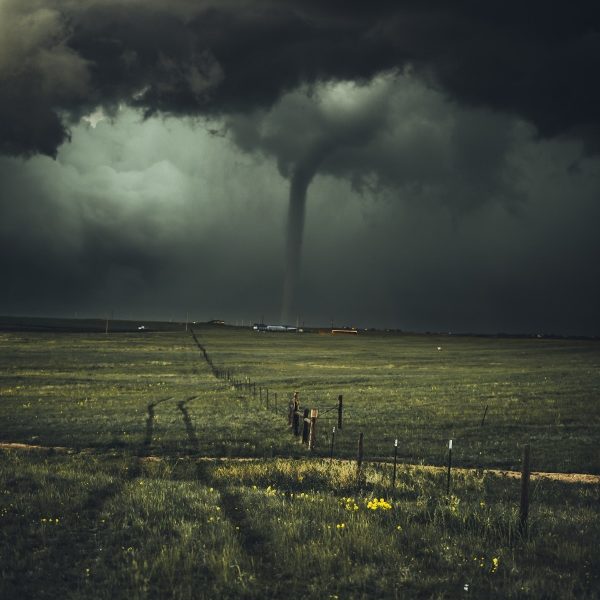It was a bright, gray day with no breeze, and she had just finished digging a grave. She’d woken that morning and her turtle had not. How should she feel on this first day without Tulip? Or on all the days without Tulip to come? Sad, probably. But sometimes being with someone only makes you feel more alone. She thought of a chair in the corner of an empty room and how it makes the room look even emptier. As she put the shovel down, the sky turned a raw-yolk yellow. She looked up and felt dizzy, so she leaned against a sapling, closing her eyes.
“Hi,” a voice said above her.
He was only a mini-tornado. Room-sized, not house-sized. He had vague shadows for his eyes and mouth, like the face people see in the moon.
“Hi,” she said, tentative.
“What’s that?” he nodded at the shoebox.
“Tulip,” she said, and she told him about pets, about death.
Suddenly, she realized she needed a eulogy. What to say about Tulip? Sebastian had brought him home in a shoebox like the one that would serve as his casket. He’d had an ugly frown and an ancient face
“Tulip,” she tried, “you were slow and steady and dissatisfied about everything.”
The tornado darkened. “But you’ll miss him?”
She shrugged.
“Ashes to ashes.” She dropped some dirt onto the lid.
“Please,” the tornado said, “let me.” He lifted a small mound and funneled it through him.
So, she thought, he’s a gentle tornado. She invited the tornado inside.
She gave him a quick tour. The living room was empty, save for one chair in a dim corner. In the kitchen, he touched the ceiling fan by accident, and it spun like a propeller and crashed to the floor.
There was the bedroom, the bathroom. In front of the last room, she paused.
“If it’s messy, I’ll clean it,” he offered. He did a graceful pirouette, and a layer of dust floated up from the carpet. The door blew open. She followed him in.
Everything was just as Sebastian had left it. The rubber ash from his old erasers, his favorite pencils, his half-used chapstick, his dirty tissues, his coffee mug. She opened a window to let it air out.
The tornado gathered a stack of loose papers. “What should I do with these?” he asked, helpfully.
She pushed them, in one motion, right out the window. They scattered like gulls and disappeared.
For dinner, she made pancakes and the tornado whipped up dollops of cream. They ate and he continued cleaning. He cleared a clogged drain and dusted the shelves. He whistled as he whirled through the hall.
“Who’s that with you?” he called at the base of the stairs. He’d just straightened a crooked photograph and polished the glass. She saw herself in it—not in the photo, but as a reflection, the dark shadows of her eyes staring back.
“Sebastian,” she said. Her voice sounded like distant thunder. She didn’t tell him anything else.
That evening, the tornado used himself as a corkscrew on a wine bottle so masterfully she asked if he’d done it before.
He couldn’t remember. His past was hazy. “It doesn’t matter where I’ve been,” he told her. “I can never go back. No place is the same once I’m gone.”
If that was a warning, it was already too late. Here he was drinking wine with her, not taking up space, just moving the air.
The next morning, she couldn’t find a few small belongings: a sock, the back of an earring, a silver bracelet. The tornado looked bigger.
“Let’s go outside?” she offered.
In the yard, he spun wildly. “Did you love Tulip?” he asked as he passed the fresh grave.
“A little,” she said. “Enough.”
She used to tell Sebastian that you should only love someone to a certain extent. “You should know you’d be complete without them,” she’d say.
Sebastian hadn’t shared her philosophy.
She was standing next to the sapling again. Sebastian had planted it. Why was it still growing when Sebastian was gone? She reached, grabbed hold of a branch and pulled it free. She kept going, grabbing and tearing, spinning around it until no branches remained. She thrust her weight into the thin trunk, but it wouldn’t budge. She found the shovel and dug it up from below.
The tornado had slowed down to watch her. He was almost entirely still.
The tornado slept in the backyard that night. He stopped growing and his winds calmed. He seemed tired or ill. She thought she saw something within him sparkle, but she said nothing about it.
Sebastian had given her that silver bracelet for an anniversary. It looked like a handcuff and never fit right. A month after he bought it, he asked where it was and she couldn’t tell him. He held it out inside his own fist.
“Here,” he said. “I’ve had it this whole time. And you didn’t even know it was gone.”
She slept outside with the tornado. “When I’m gone,” he said in the morning, “you can miss me. But I won’t even know who you are.”
He had it wrong, she thought. “That makes you lucky,” she said. But he couldn’t hear her. Inside him, there was lightning and rain.
“Tell me about Sebastian,” he called out. And since she knew he’d be gone soon, she did.
The last time she saw him, everything was bright and gray as if there were no such thing as weather at all.
“Are you still there?” she whispered. He was still there.
She reached for him and the sky turned yellow. He said nothing. She said nothing. They knew. And then—in an instant—there was no sound, no light, no air, only that violent kind of emptiness that you carry inside you, around and around and around.

